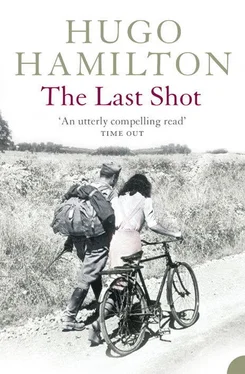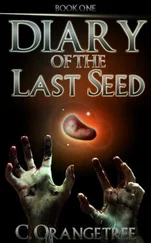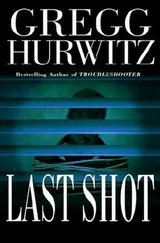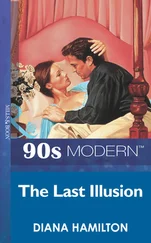As the clouds moved above us, the bright patches of land seemed to shift too. We stood in sunlight, still unusually warm for October, reviewing this shifting landscape. Anke was holding my hand. We could see Münster under rain; the sky and the land were connected by blue-grey beams of rain. Elsewhere, the sun chased the rain. The sky was full of colour.
Anke pulled me towards her, as if to say ‘enough of this talking’. I should not have been so surprised; she had no need for an explanation. She kissed. There was something about the shape of her lips, or maybe it’s the taste of her lips, that was so clear; I was able to say I remembered Anke’s lips. Lips never change.
None of this was intended. Afterwards, it seemed completely unavoidable.
Anke placed the side of her face against my chest. Perhaps I thought she wanted the comfort of a stranger, of an old friend. I kept staring out over her head at Münster under a downpour. Something told me that we would soon be under the same downpour. We ignored it.
These are some of the things that came to mind as Anke took my hand and led me back into the trees. I thought of the evaporation which takes place when the sun hits the road after rain. I thought of Anke in Düsseldorf, her apartment, her balcony. I have never separated her from these memories.
Funny. I began to think of horses. It’s happened before. Maybe there is something erotic about horses. The sight of a horse’s eye. The smell of horses. The way they walk. The crunch of a horse chewing an apple. I lingered on apples for a moment, apples left on trees long after they ripen, long after the leaves have withered, gone yellow; waiting for the first substantial storm to clear them all.
Anke found a place among the trees where the sun came through. I was aware that Anke had a look in her eyes that bordered on the ferocious. I was aware that she put her back against a tree; you can feel it when somebody can’t go back any more.
We said nothing about Jürgen. Would it have made any difference? I thought of Jürgen, working in his practice. I thought of the women putting make-up on before their examination. Then I thought of the bikes badly concealed among the trees at the foot of the hill.
I was aware of the smell of rain. And the smell of pine. I was aware of warmth. I was aware that we were free-standing at times, that I held her thigh with one hand and her neck with the other, that she held on to a branch for support, and that, if anyone had been watching at a distance, they would have seen the top of the tree rocking.
Another squadron of RAF jets flew over the area, not directly over us but somewhere close, maybe two kilometres away, enough to fill the forest with solid noise. We couldn’t hear each other. All I saw was Anke’s eyes; fierce, in pain, in tears, in ecstasy.
The sound of the jets receded. Either that or it merged with the sound of rain. We might have sheltered in the trees, but we ran down to the bikes and began to set off along the road. The rain bounced on the red sand. There were pools along the path with domes of milky brown bubbles from the force of the rain. An orange spray leaped up from Anke’s back wheel. Her hair was washed firm against her skull and in a fringe down over her eyes.
Jürgen was bound to have his suspicions. After all, Anke and I had a past together. He had good reason to kill me. I thought of that over the next three days. I had every intention of leaving. Sooner or later, I was sure Jürgen would come back and find us in the apartment, if not actually in bed then both having a shower at a most peculiar time of day: 2 in the afternoon.
It didn’t stop.
Anke and I got on so well. We could talk about things. Maybe if we knew that we would spend the rest of our lives together, who knows, we might have run from each other. If I had asked her to divorce Jürgen, she would have said no. But I never asked. If we could have predicted the future, perhaps we would not have have been so desperate.
One morning, after Jürgen had gone to work and Alex had been collected by the special bus, Anke came in with coffee. She got into my bed and we talked for a long time. There seemed no end to the things we had to say to each other. My fear of running out of things to say to people disappeared with Anke.
She sat up in the bed, resting on her elbow, holding her saucer in one hand, the cup in the other, sipping occasionally and letting her head lean over so that her brown, or is it russet, hair hung. I told her that I had been in Nuremberg looking for Franz Kern. I told her what I knew. I explained how I had given up the search back in 1985 and was half-thinking of taking it up again. She encouraged me. Kept saying I should go back to Nuremberg to establish what happened.
It was good to talk to her about it. I told her that it seemed unfair to harass old people who wanted to forget what happened. Nonsense, she said. She would do it herself. But then, Anke never had any second thoughts about anything; she always went ahead applying her first and as usual most accurate instinct. I said it made me feel a bit like a Nazi-hunter. I felt I had no stomach for it, dragging the past out of people wasn’t my idea of pleasure.
I changed the subject. I asked her if she and Jürgen would come and see me in Düsseldorf some time.
‘Difficult,’ she said.
It was stupid to ask. I didn’t pursue it. She placed her cup and saucer on my forehead. The coffee was no longer hot, but I could feel warmth conducted through the saucer into my forehead. I could also see that there was still come coffee left. It was glass crockery, the kind that doesn’t break when it falls on the floor. She allowed the cup and saucer to balance there on my forehead while I began to laugh, a sort of helpless laugh, knowing that using my hands to remove it or steady it myself was cheating.
‘Leave it,’ she said, restraining my hands.
The cup rocked with my laughing.
‘Handy having you here,’ she said. ‘Somewhere to put my cup while I’m in bed.’
I struggled to free my hands. I could have remained still and prevented the cup from falling that way. In that case, she said, and began to tickle me. I laughed and struggled with her until the cup tipped over and the luke-warm coffee soaked my chest. She fell backwards laughing while I put away the cup.
Jürgen did find out, as it happens. He rang during the day and said we would all go out to dinner that evening; the last evening. Frau Moltke, an occasional babysitter, came to look after Alex.
At the restaurant, Jürgen pretended he knew nothing. He talked about Germany. And football. He talked about his practice. He was now certain that he would have to employ another gynaecologist, his third. The reputation set up by his father’s practice was doubling by the month.
Anke was dressed up. She wore long silver earrings. They looked like lizards. Her hair was tied up at the back. I could see the flame of the candle reflected in her eyes. She wore a turquoise off-the-shoulder dress and I could see a sort of matt refulgence on her bare shoulders. Jürgen wore a loose beige jacket with pronounced shoulders. He looked strong.
It was the one thing that I was certain of with Jürgen. Nothing would incite him to impatience. Violence would have been inconceivable. Maybe he was capable of killing for revenge. I wasn’t sure. This fine Greek restaurant seemed a good place to take out a gun and shoot your wife’s lover.
We spent most of the time talking about Eastern Europe. Jürgen said it was the most important revolution in history. More important than the French Revolution. Perestroika would put us all to shame, he thought. Then he told us about his difficulties in finding another gynaecologist.
‘Not a decent gynaecologist to spare between here and Dresden,’ Jürgen said, laughing openly. We had drunk quite a bit of wine.
Читать дальше
Конец ознакомительного отрывка
Купить книгу












